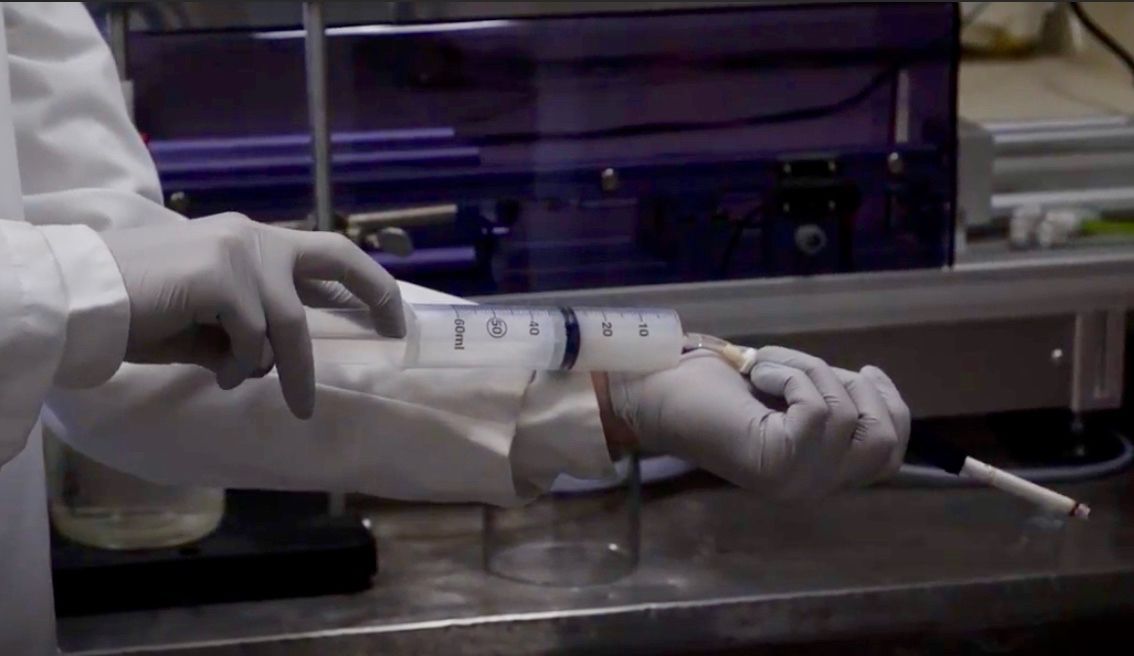Projects include studies of physiological stress and cancer treatment, use of tobacco and e-cigarette products
- 13 Roswell Park researchers received national funding totaling $10.04 million
- Funded projects include studies on physiological stress, filtered cigarettes
- Another will look at e-cigarette use during pregnancy, impact on birth outcome
BUFFALO, N.Y. — Roswell Park Comprehensive Cancer Center scientists have received a dozen recent competitive grant awards totaling more than $10 million from federal agencies. The largest individual award is a five-year grant that will support investigations into how certain forms of stress may impact our immune system. Three of the projects seek a better understanding of the behaviors involved with smoking and use of electronic cigarettes.
“Since Roswell Park’s opening 120 years ago, it has become one of the leading cancer centers in the country, and the medical research done there has led to major advances in cancer diagnosis and treatment,” says Sen. Kirsten Gillibrand. “This federal funding will allow Roswell Park to continue providing high-quality medical care to New Yorkers affected by cancer, and will draw some of the best scientists and physicians to Western New York. I am proud to support Roswell Park as they continue their groundbreaking work in combatting this terrible disease.”
“It is truly incredible to consider the depth and breadth of research happening right here in Western New York at Roswell Park,” adds Congressman Brian Higgins. “These federal grant commitments totaling $10 million represent the confidence placed in the work of local scientists advancing our understanding and treatment of cancer.”
Elizabeth Repasky, PhD, Professor of Oncology in the Department of Immunology, received a prestigious “R01” grant for $2.83 million from the National Cancer Institute (NCI) for the project “Understanding how adrenergic signaling influences immune contexture of tumors and the efficacy of checkpoint inhibitors.”
“Over the last few years, our team has made a number of important discoveries about the way the body responds to different stresses. We believe that reducing the kind of stress that drains us of energy stores may help the immune system to fight off cancer and may improve response to cancer treatments, particularly immunotherapies,” notes Dr. Repasky.
Richard O’Connor, PhD, Professor of Oncology in the Department of Health Behavior, received a five-year, $2.79 million subcontract award from the University of Minnesota, part of a larger NCI-funded effort to contribute evidence around the regulation of filter vents, the feature that qualifies some cigarettes as “light.”
“These vents make the smoke feel less harsh and reduces the emissions as measured by machines,” says Dr. O’Connor, “but people compensate by taking bigger puffs and/or blocking the vents while smoking, resulting in more exposure than they perceive.”
Eugene Yu, PhD, Professor of Oncology in the Department of Cancer Genetics and Genomics, received two recent grants together totaling more than $2 million. The first is a five-year, $1.82 million R01 grant from the Eunice Kennedy Shriver National Institute of Child Health and Human Development for a collaborative project aimed at understanding how the presence of extra human chromosome 21 (trisomy 21) affects Down syndrome phenotypes through epigenetic mechanisms. Results from this work will be relevant for understanding such effects in human cancer cells, which often carry chromosomal gains and losses. Dr. Yu also received a two-year, $229,947 subcontract from Moffitt Cancer Center to model sarcoma-associated chromosomal translocations using chromosome engineering and then employ imaging analysis to identify different tumor habitats in the models, as part of a larger NCI-funded effort.
Other recent grantees and their projects:
Ravindra Pandey, PhD, Distinguished Member of the Photodynamic Therapy Center and Professor of Oncology in the Department of Cell Stress Biology, in collaboration with Heinz Baumann, PhD, member of the Department of Molecular and Cellular Biology, and Chukwumere Nwogu, MD, PhD, FACS, Professor of Oncology in the Department of Thoracic Surgery, received a two-year, $651,472 subcontract award from Photolitec LLC, part of a larger National Institutes of Health (NIH) project to investigate the utility of a new agent for fluorescence and PET imaging for guidance of photodynamic therapy (PDT) in combination with chemotherapy for lung cancer.
Subhamoy Dasgupta, PhD, Assistant Professor of Oncology in the Department of Cell Stress Biology, received a three-year, $620,055 award from the NCI to investigate factors promoting metastasis of prostate cancer to the bones toward the goal of developing new and better therapies.
Maciej Goniewicz, PhD, PharmD, Associate Professor of Oncology in the Department of Health Behavior, received two subcontract awards, each part of larger NCI-funded projects to study electronic cigarettes. “E-cigarettes are the fastest-growing non-cigarette product available to smokers, yet the scientific basis for understanding these products has not kept pace,” explains Dr. Goniewicz. His five-year, $398,549 grant funds the first study of e-cigarette use during pregnancy to assess toxin exposure and birth outcomes among women interested in quitting smoking. A second five-year, $230,633 award to Dr. Goniewicz is part of a nationwide effort to evaluate patterns of use, nicotine intake, exposure to toxicants and changes in smoking combustible cigarettes among e-cigarette smokers and nonsmokers.
Song Yao, PhD, Associate Professor of Oncology in the Department of Cancer Prevention and Control, and Kara Kelly, MD, Waldemar J. Kaminski Endowed Chair of Pediatrics, received a two-year, $174,100 grant from the NCI to identify whether certain genetic differences underlie differences in bone toxicities observed between Hispanic and non-Hispanic children treated for acute lymphoblastic leukemia. The findings may help predict risk of such toxicities so that better treatments and prevention measures can be implemented.
Beth Pflug, PhD, Associate Professor of Oncology in the Department of Urology, received a three-year, $132,140 subcontract from the University of Texas at San Antonio for a U.S. Department of Defense-funded project to study the integration of energy-sensing pathways in prostate cancer progression by testing how the lipid synthesis pathway is modulated by folate and prostate-specific membrane antigen.
Sandra Gollnick, PhD, Director of the Photodynamic Therapy Center, received a one-year, $113,165 supplemental grant from the NCI to study the impact of gender on tumor response to PDT.
Joseph Spernyak, PhD, Co-Director of the Translational Imaging Shared Resource, received a two-year, $50,489 subcontract grant as part of a larger NIH award to the University at Buffalo. Dr. Spernyak will work to develop an iron-based MRI contrast agent as an alternative to gadolinium-based agents to improve safety for patients needing contrast-enhanced MRI scans.
###
Roswell Park Comprehensive Cancer Center is a community united by the drive to eliminate cancer’s grip on humanity by unlocking its secrets through personalized approaches and unleashing the healing power of hope. Founded by Dr. Roswell Park in 1898, it is the only National Cancer Institute-designated comprehensive cancer center in Upstate New York. Learn more at www.roswellpark.org, or contact us at 1-800-ROSWELL (1-800-767-9355) or ASKRoswell@roswellpark.org.
Annie Deck-Miller, Senior Media Relations Manager
716-845-8593; annie.deck-miller@roswellpark.org

